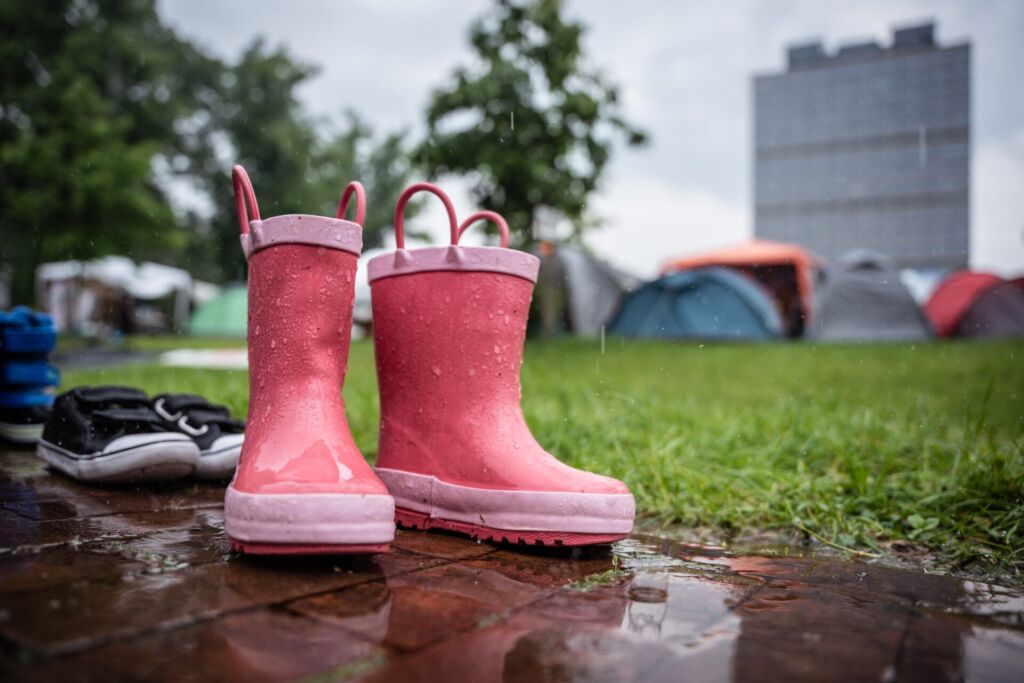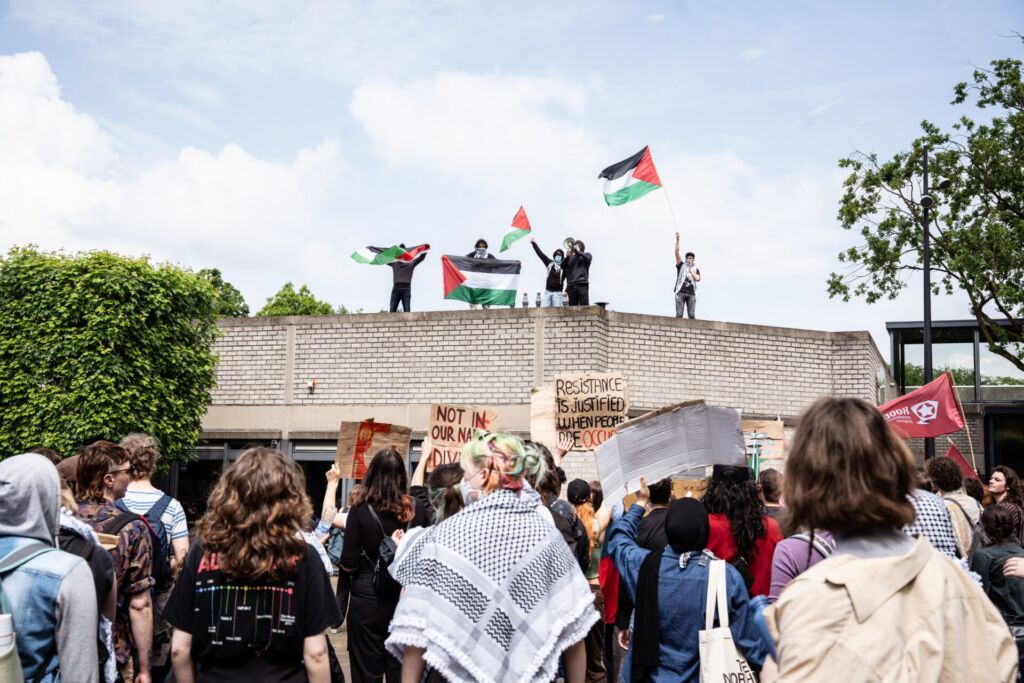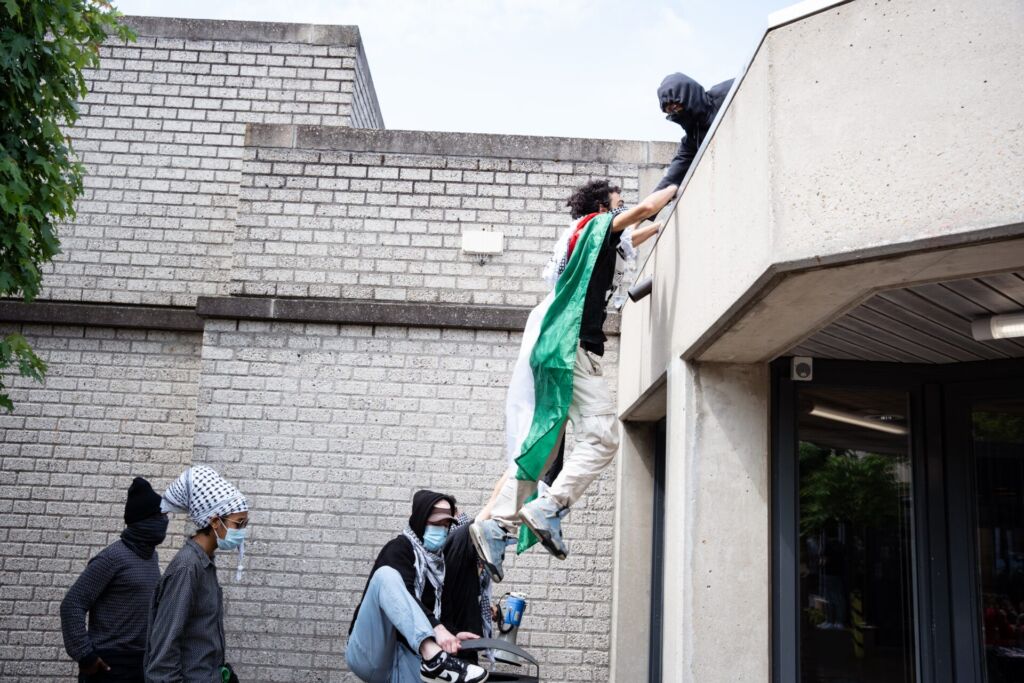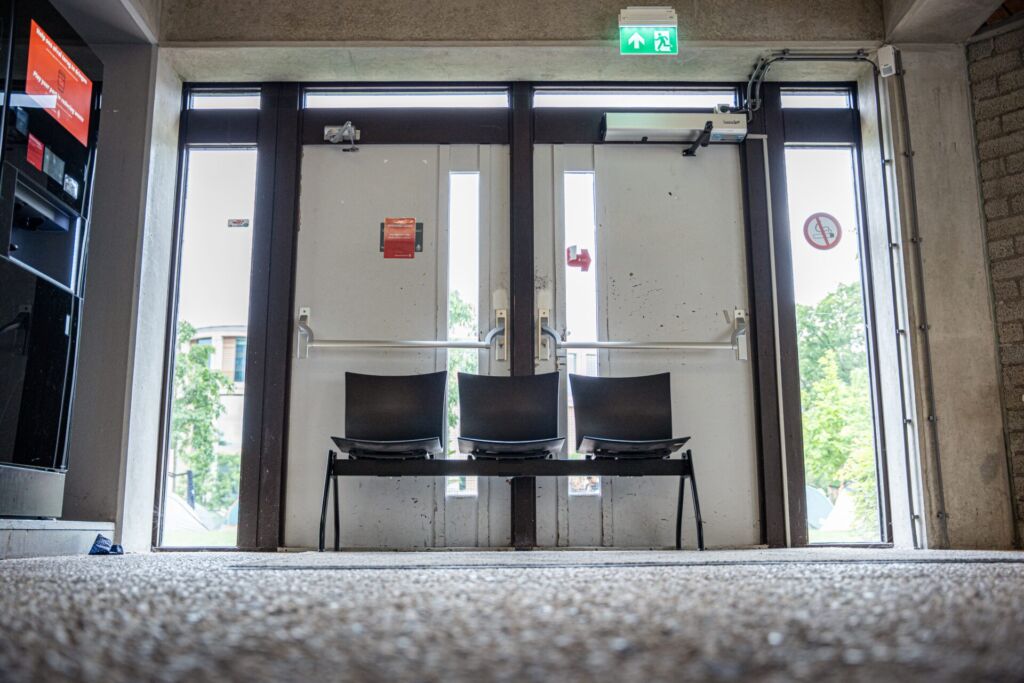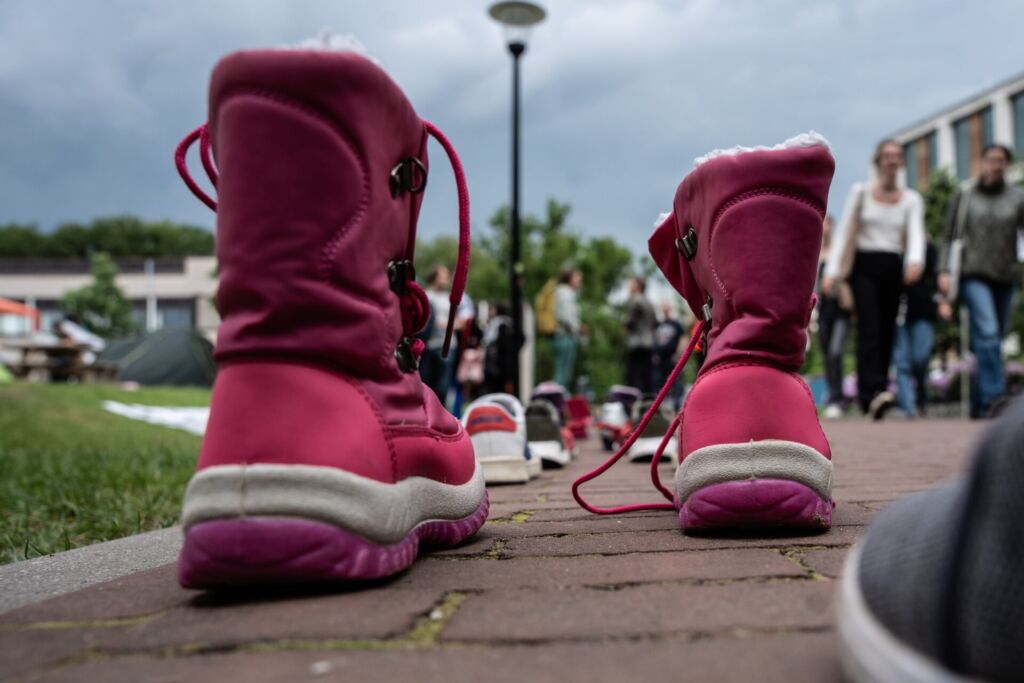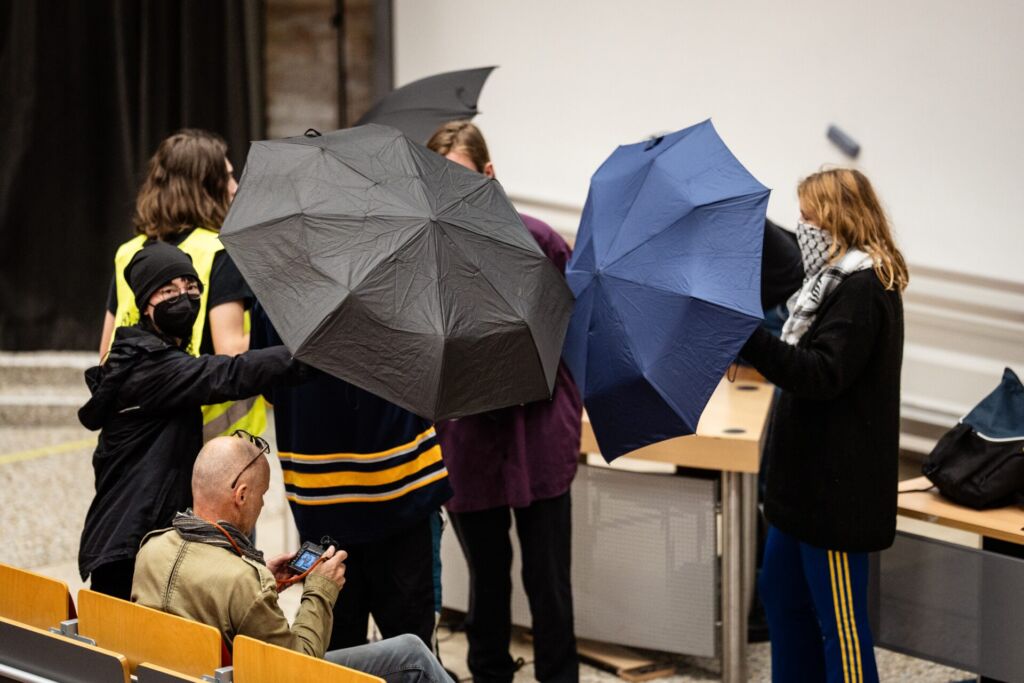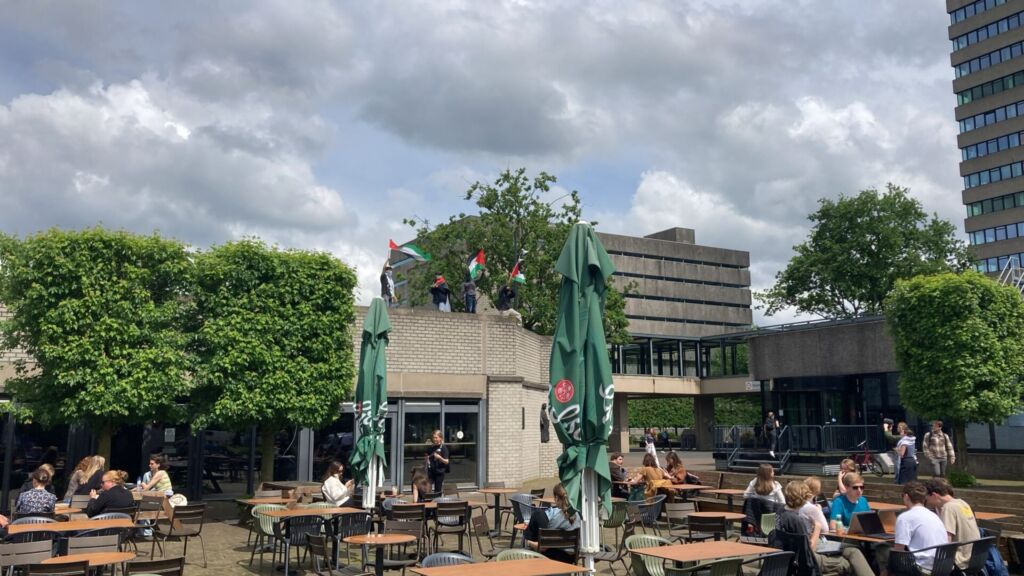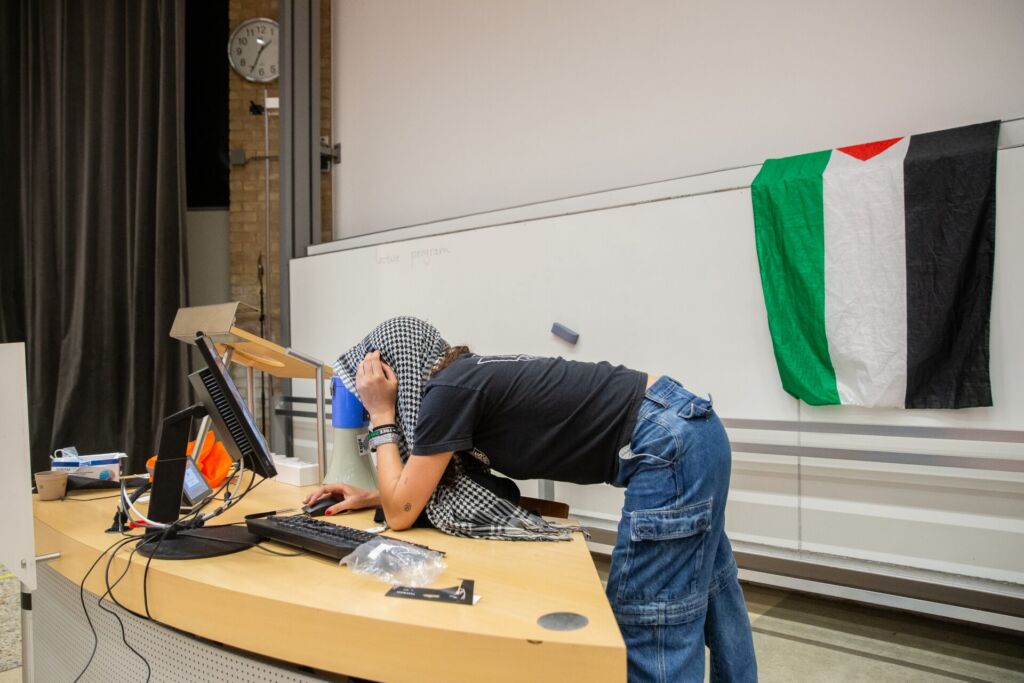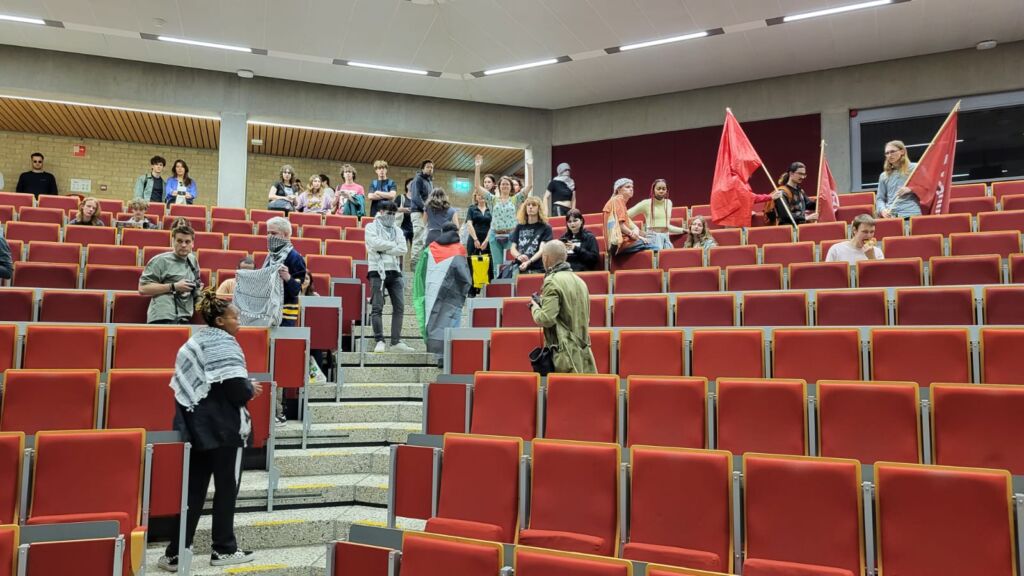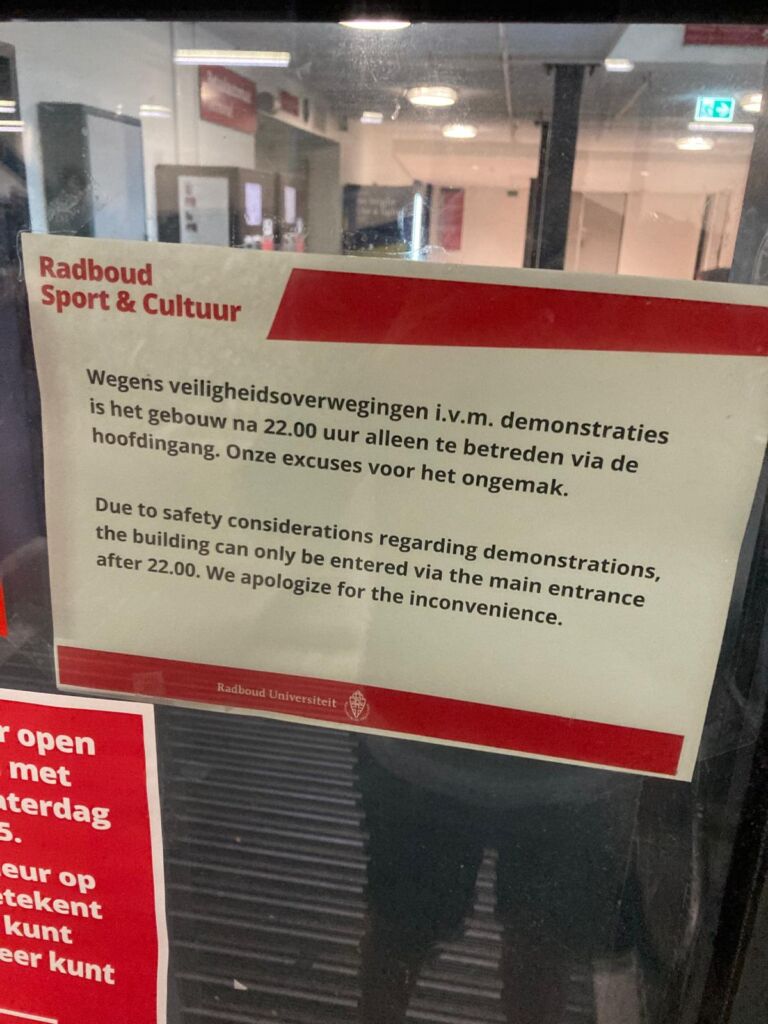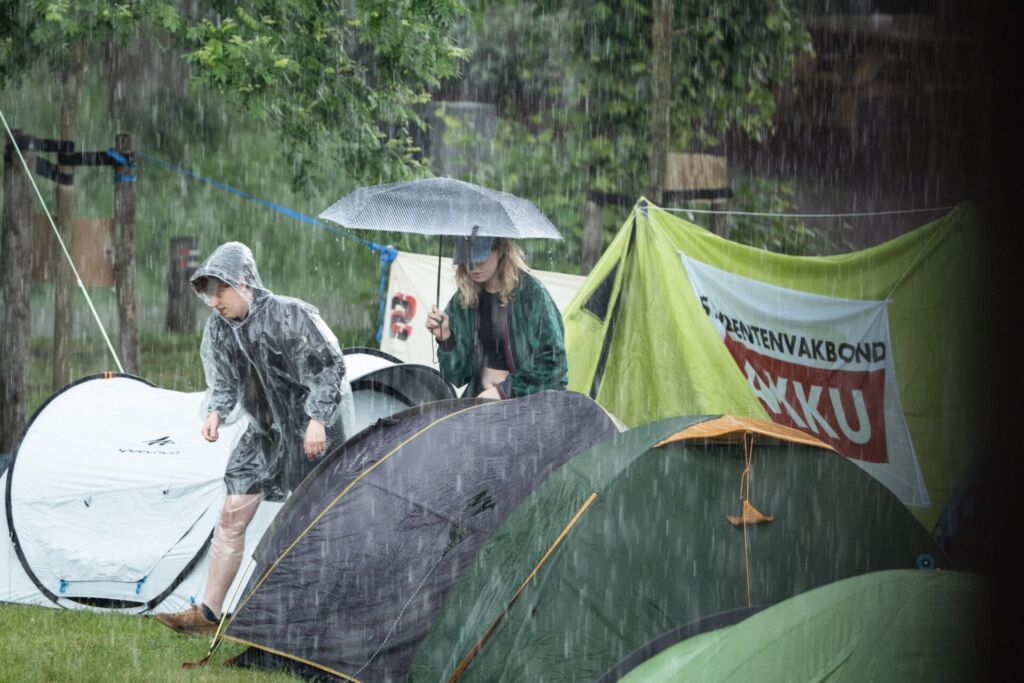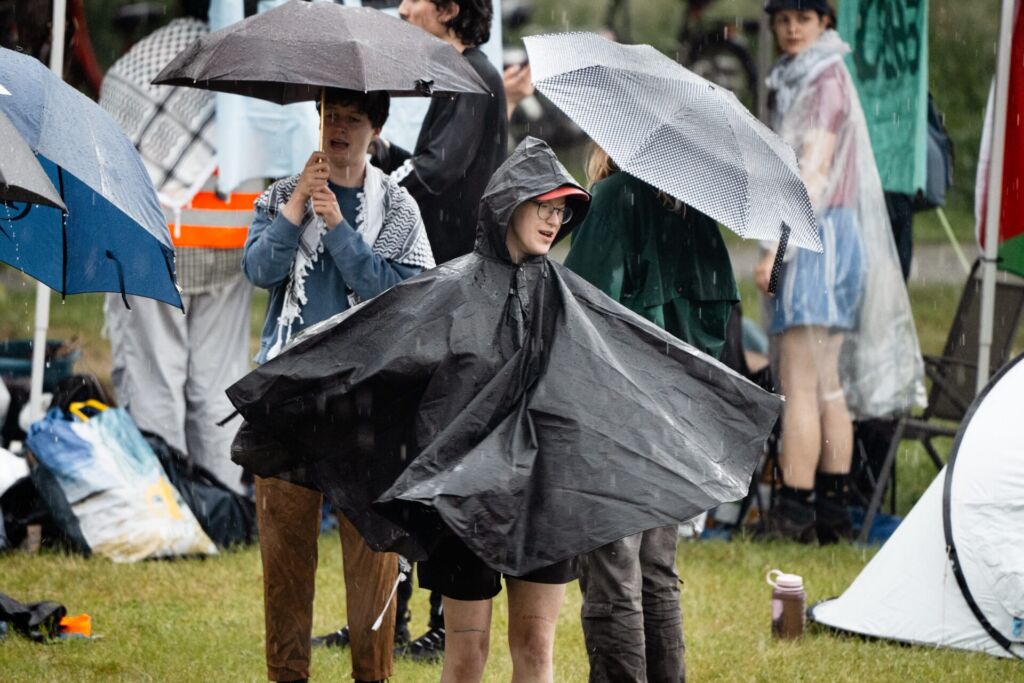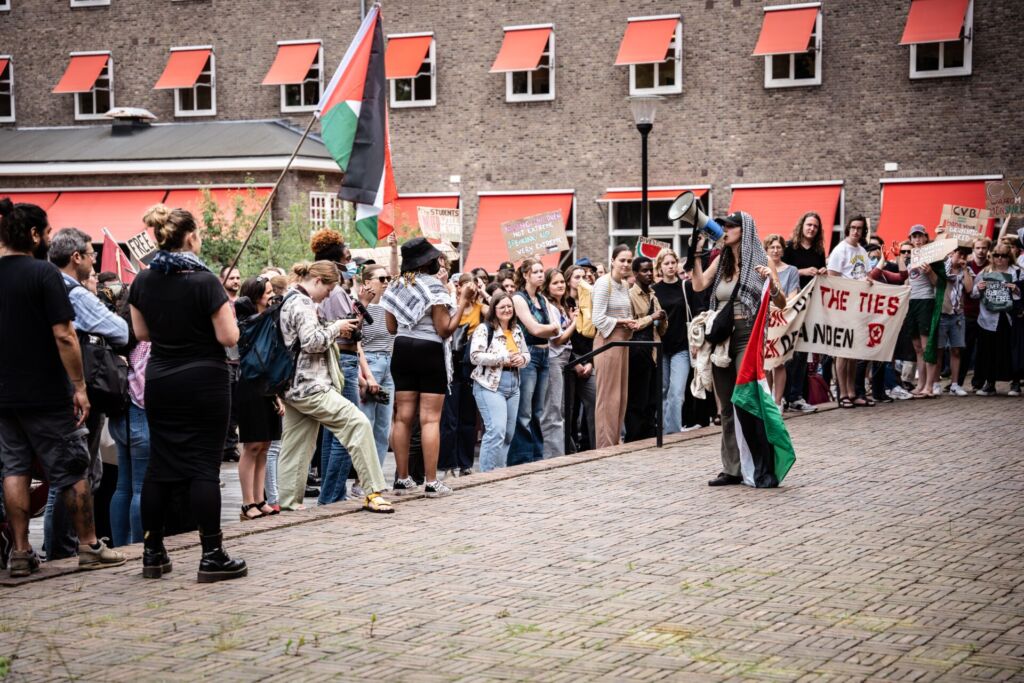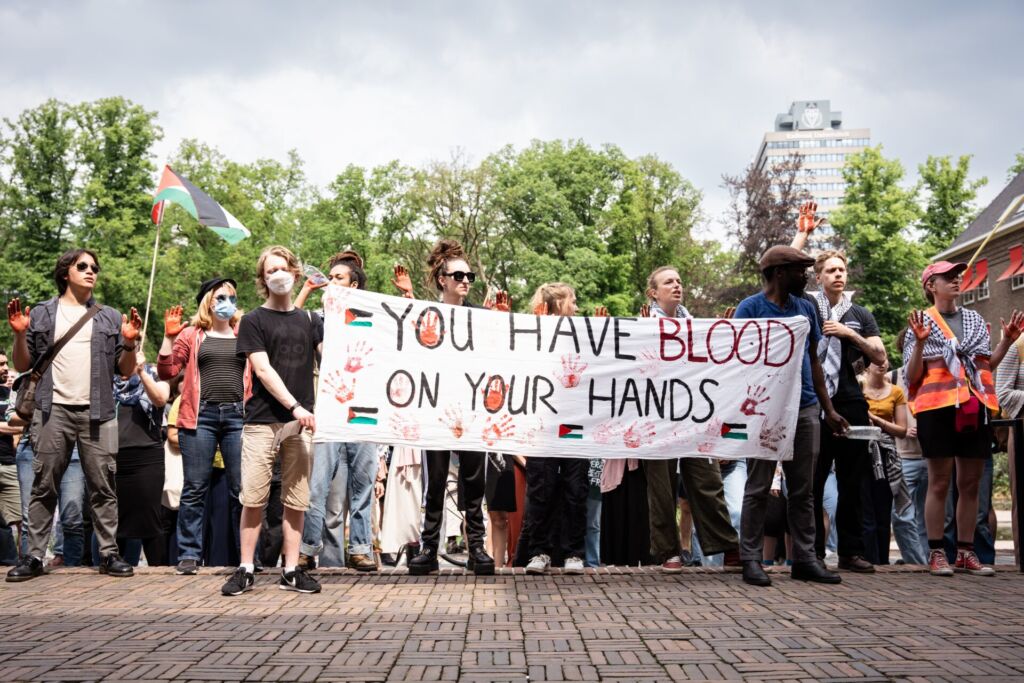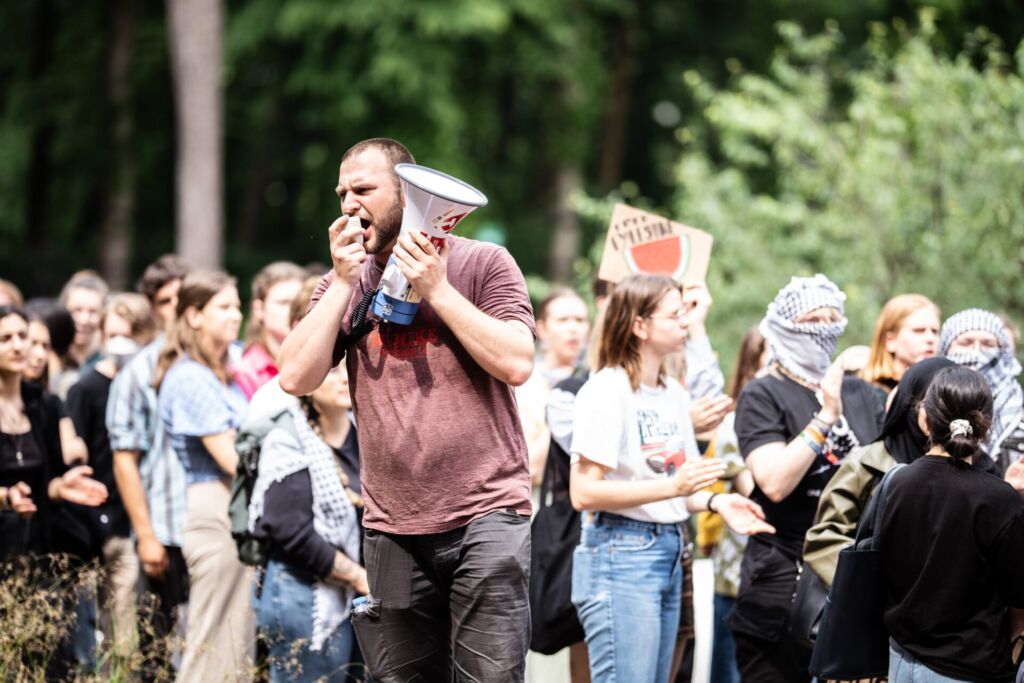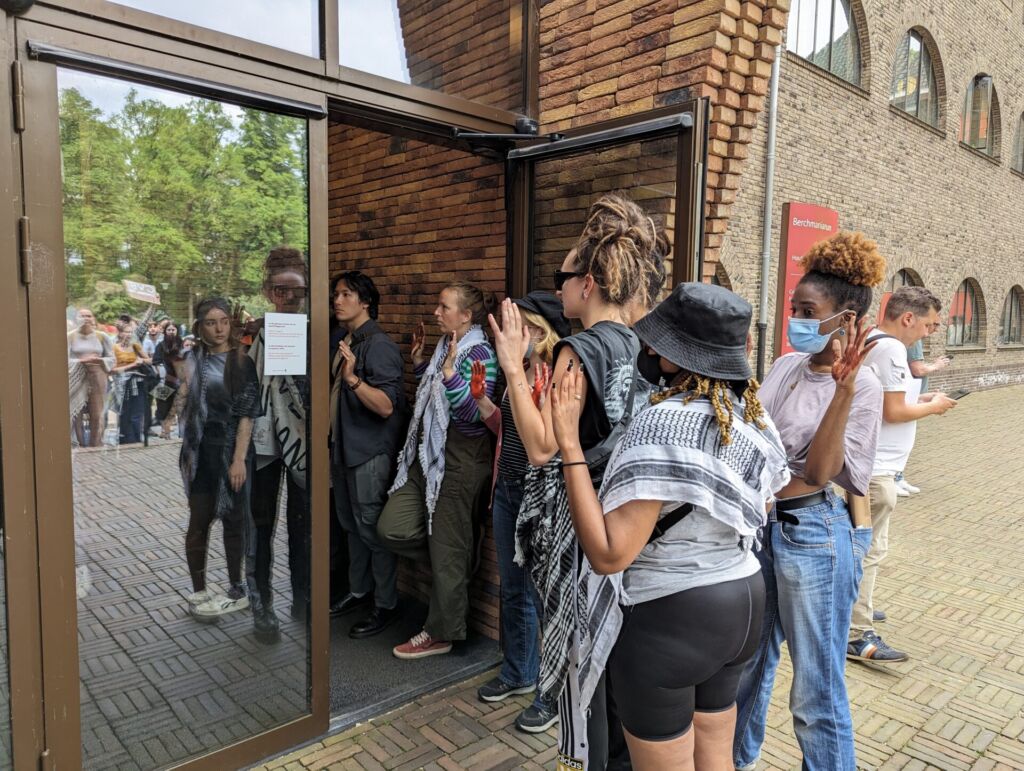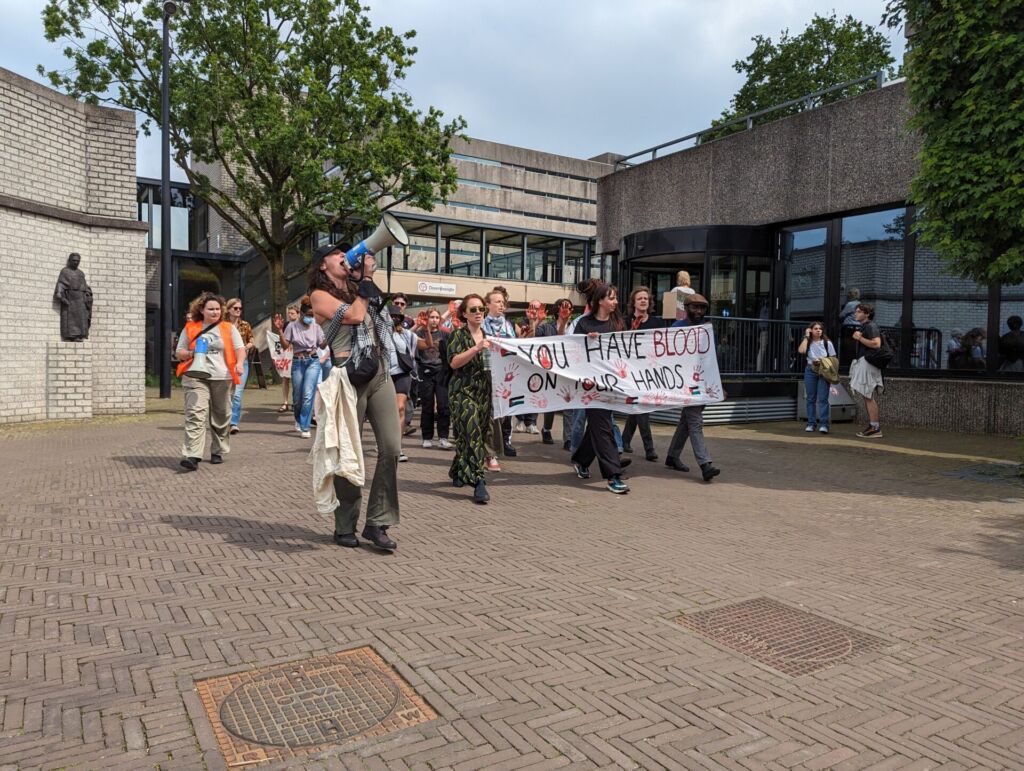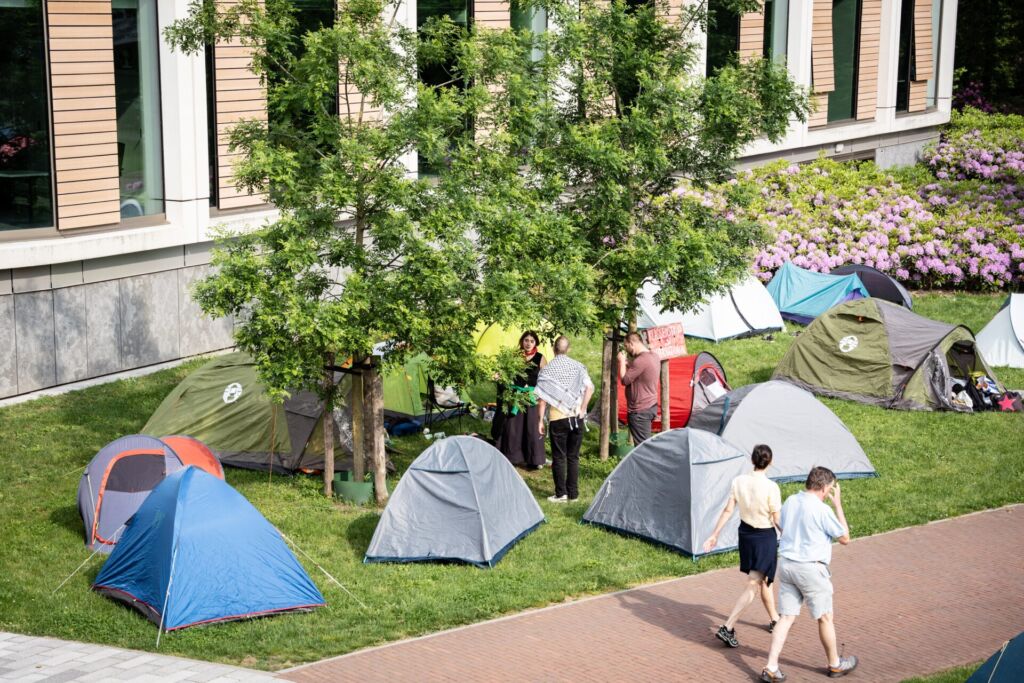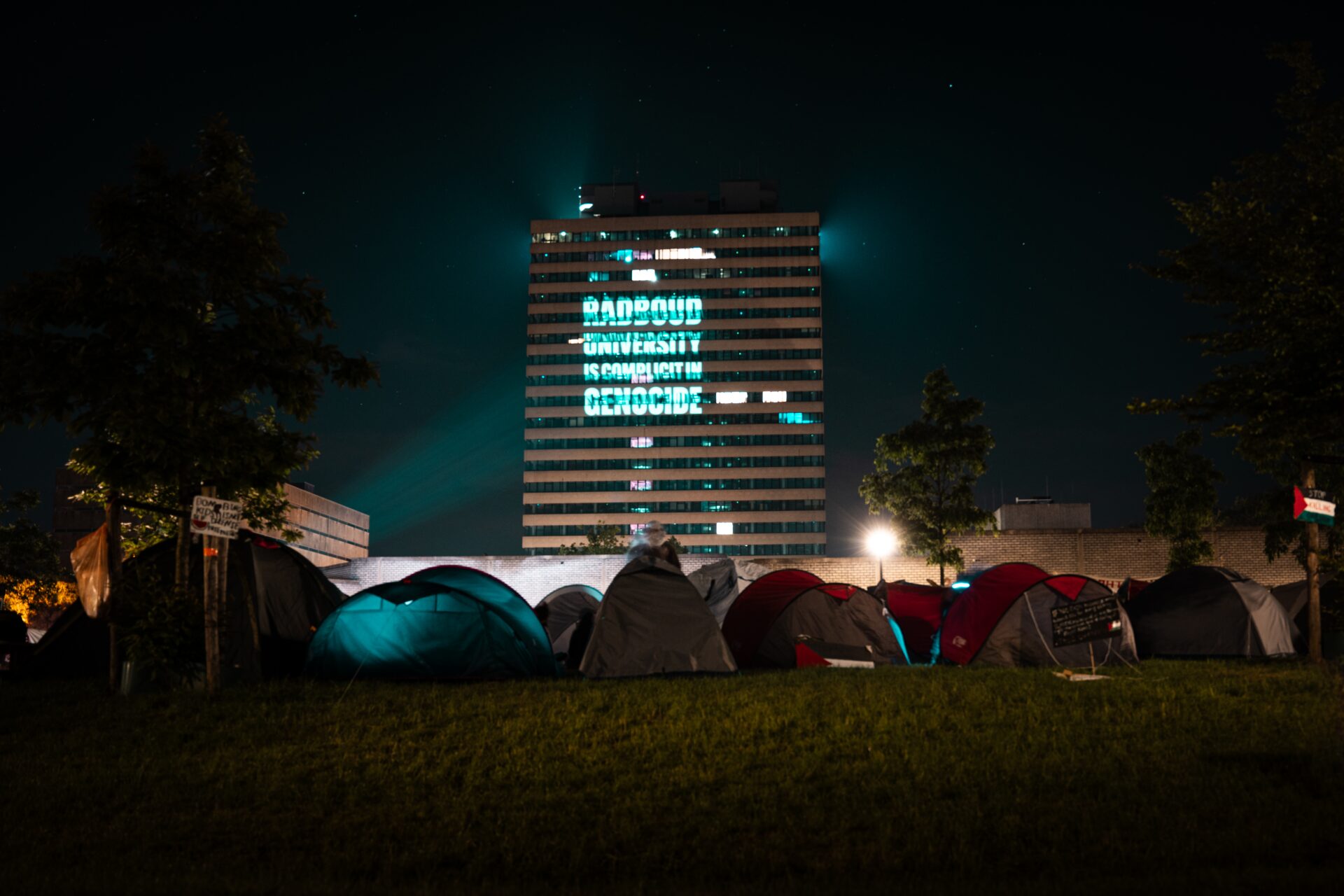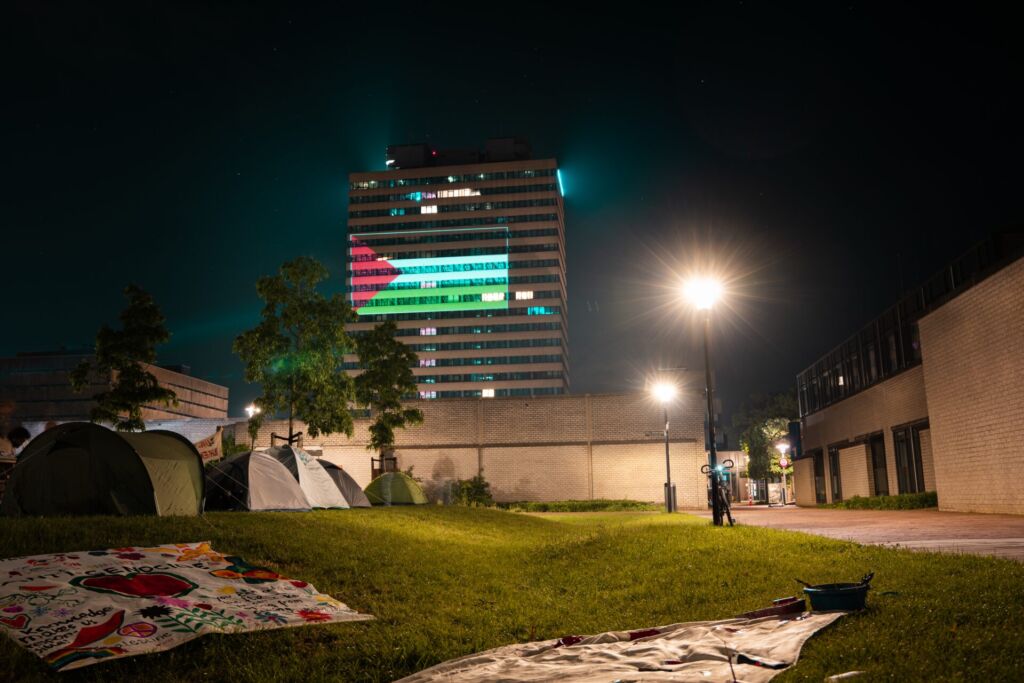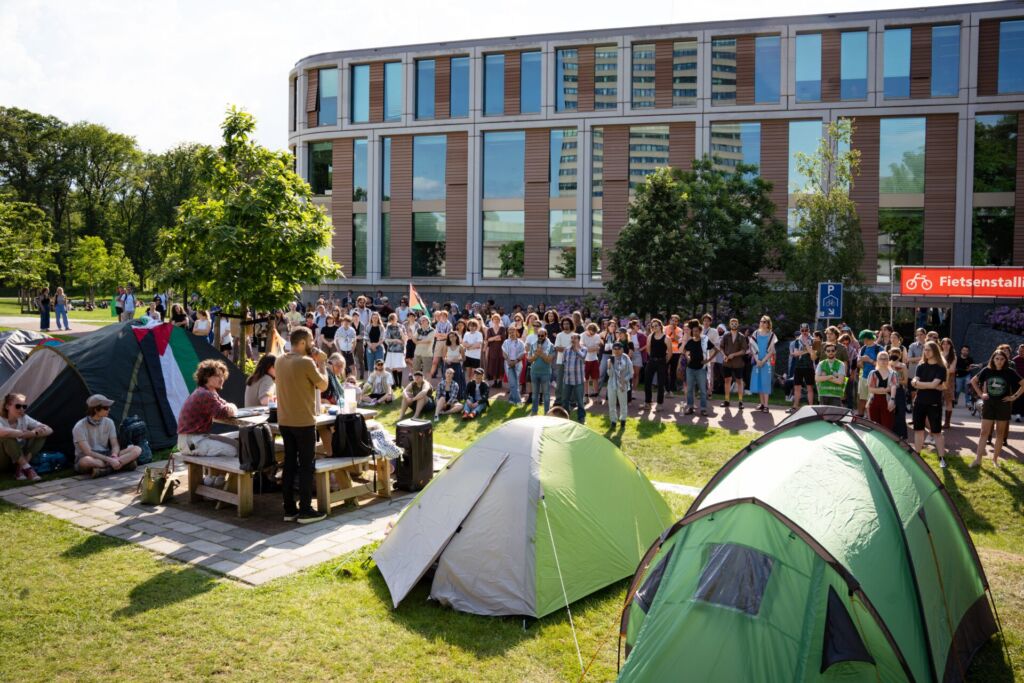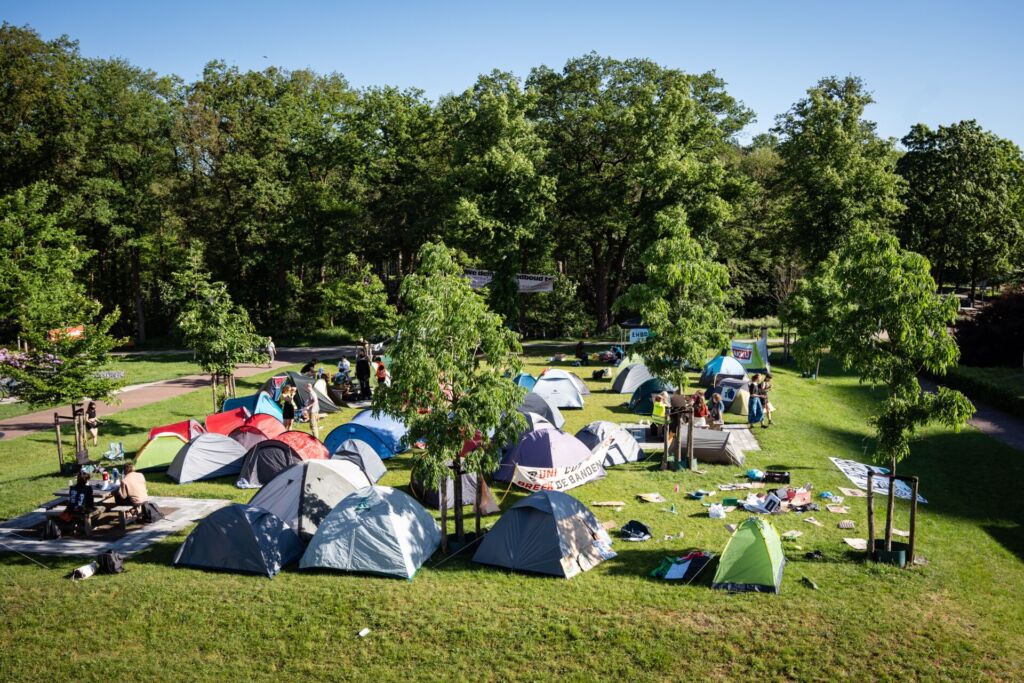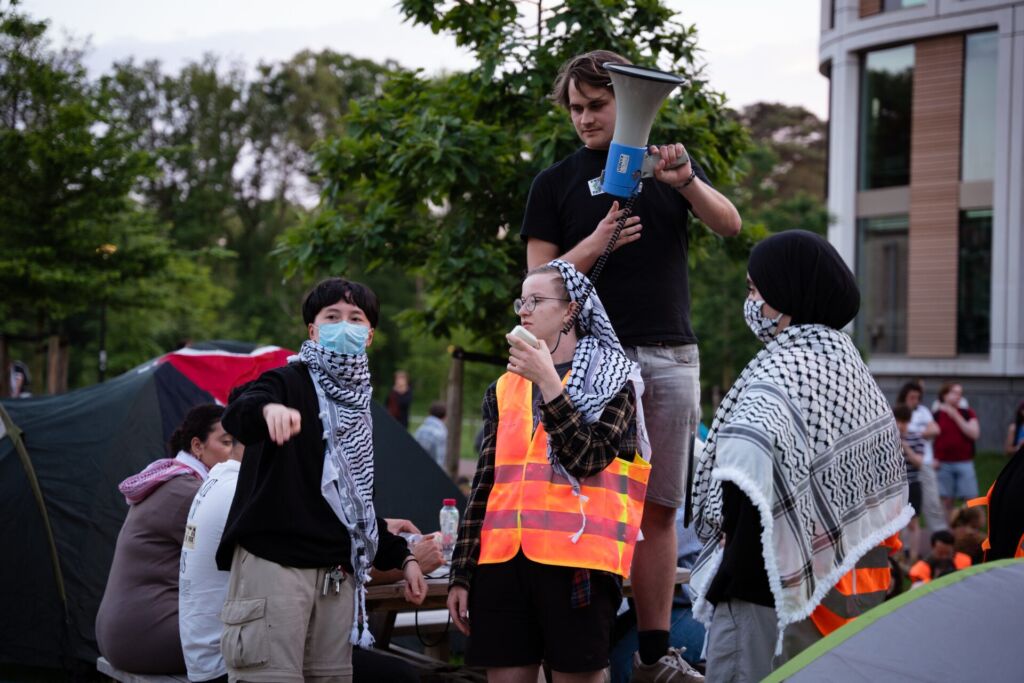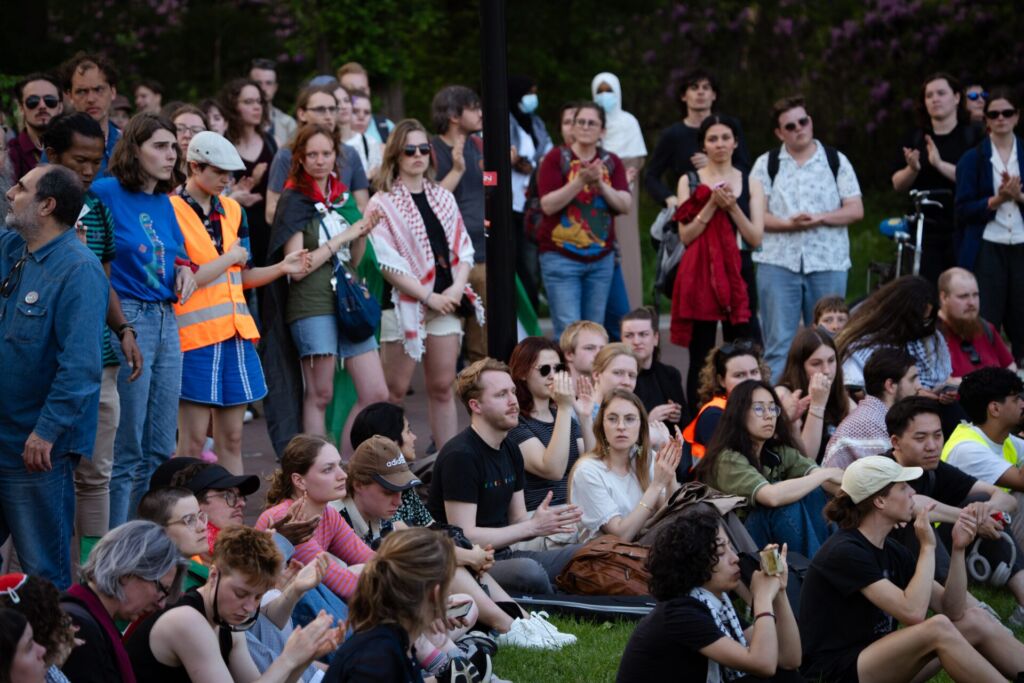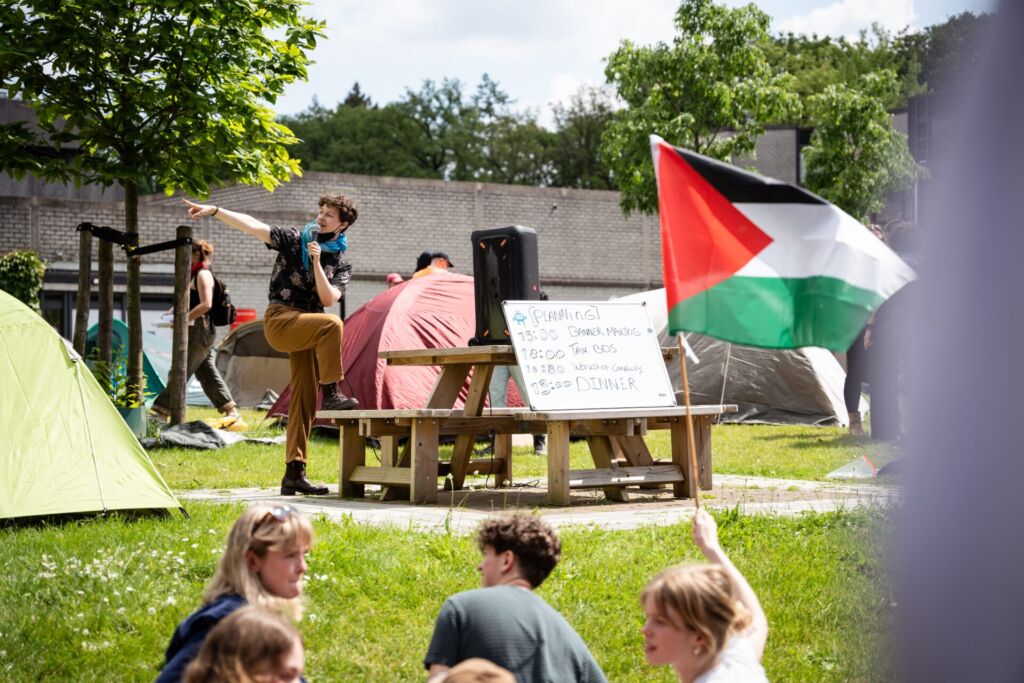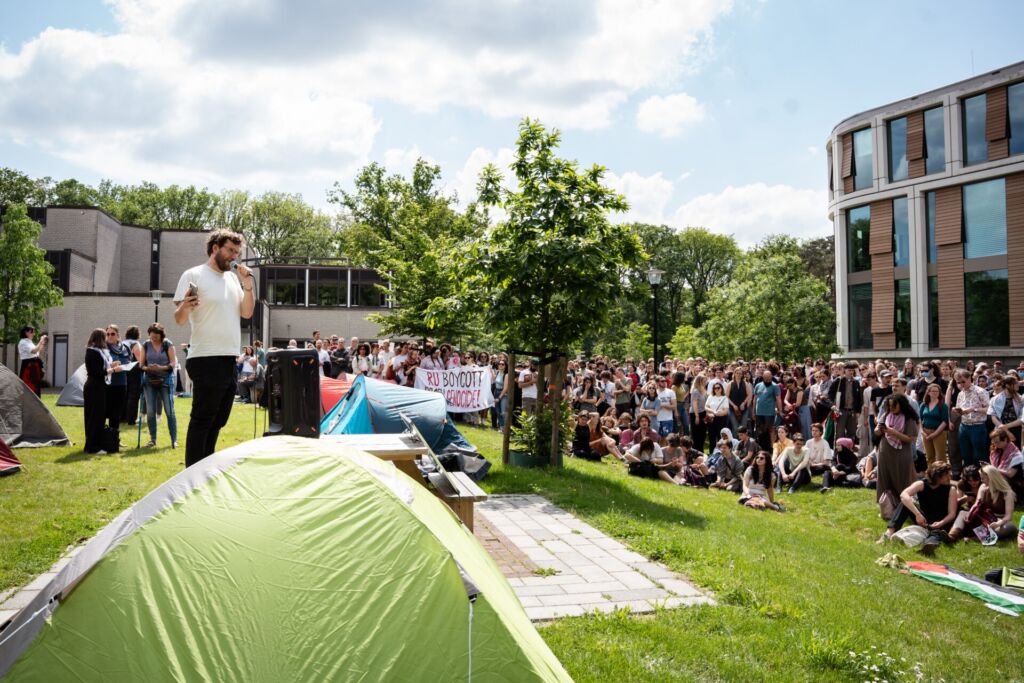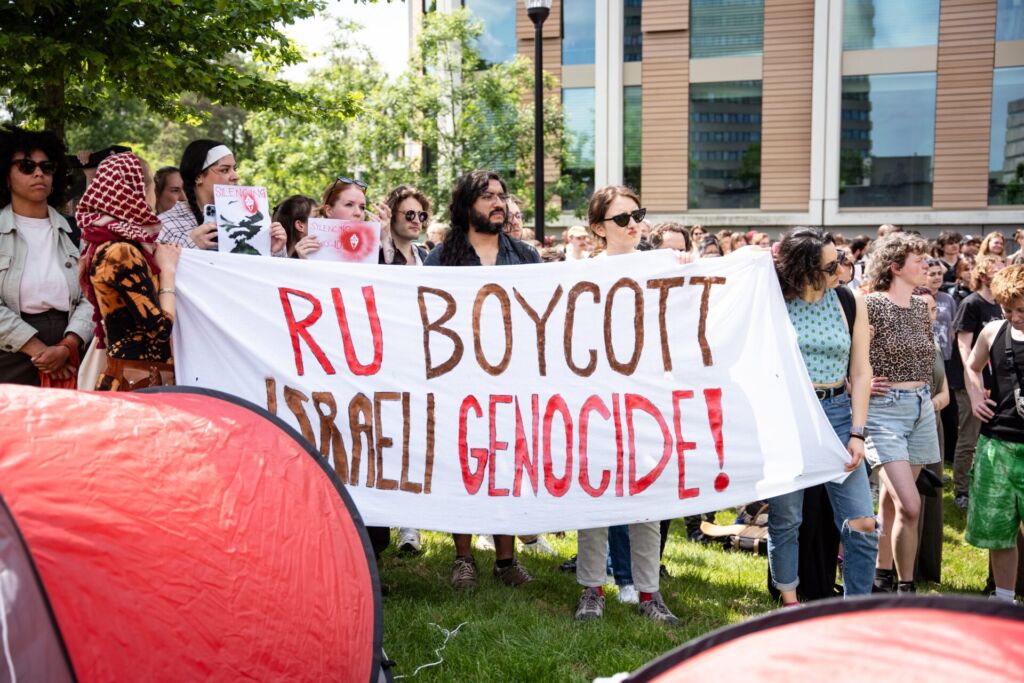From camp to temporary occupation: this was the first pro-Palestine protest week on the Nijmegen campus
-
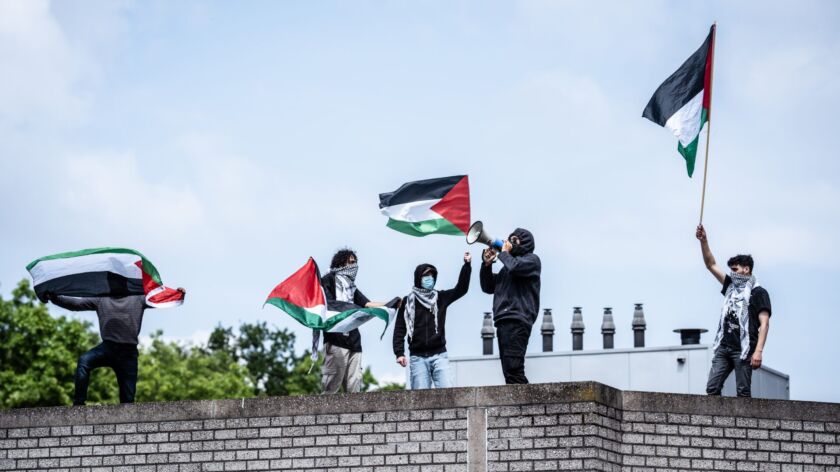 Foto: Johannes Fiebig
Foto: Johannes Fiebig
On university campuses in the entire country, students are protesting against the violence in Gaza. Activists want the institutions to sever ties with Israel. Since Monday, Nijmegen for Palestine has established a camp next to the Montessori building. Read about all the developments of the past week here.
This live blog has been (temporarily) closed. For major news events, we will reopen the live blog or inform you through new reports on the developments.
Friday, 17:50. The tents are staying for the weekend.
The activists are preparing for the weekend, according to spokesperson Ties. A representative of the group had another meeting on Friday afternoon with the Executive Board but returned dissatisfied to the camp. ‘The University wants to set up an ethics committee that can investigate its ties with other institutions,’ says Ties. ‘But to me, it’s very clear that the University is working together with universities that are contributing to the genocide in Gaza.’
Because of that, the activists have decided to remain on campus. ‘We’re now going to restructure the camp a bit,’ according to Ties. ‘The tents are a bit randomly placed now. We want to set up a larger tent in the middle and then arrange the others neatly around it.’
No sooner said than done: a few minutes later, the tents are moved to another field, so the original field can be used as a central meeting place.
Friday, 16:45. University and municipality don’t intervene.
It appears as if the students presently at the camp will enter the Pentecost weekend without too much trouble. Except for the prediction of rain – a heavy downpour already passed over the camp today.
Radboud University does not appear to plan an intervention. That protesters took over the public road today without notice and have climbed the lecture hall complex (CC) for the second time does not change the status quo already achieved on Monday evening. A university spokesperson calls today’s actions ‘unacceptable,’ but states that employees were able to get the students off the roof after a consultation.
Nothing will change for the municipality either. ‘Because of the short duration of this afternoon’s actions, we don’t see a reason for intervention at the moment,’ said a spokesperson on behalf of mayor Hubert Bruls today.
Friday, 15:00. Trying a country for genocide, how does that work?
How can a country be tried for genocide? What are the limits of international law? And what happens if a state is found responsible for genocide by the International Court of Justice? In the newest episode of the Vox-podcast In a Nutshell, Sally (Sarah) Thin, assistant professor in International and European Law, will tackle the complicated topic of international law and South Africa’s ongoing genocide case against Israel.
The episode is available on Voxweb, Spotify, Amazon Music, PocketCasts and AntennaPod (App).
Friday, 14:30. Prison sentence for violent perpetrator at UvA protests.
An Amsterdam judge has sentenced a former student of the University of Amsterdam (UvA) to one month in prison for violence against the police during a pro-Palestine protest last week. Three suspects were in summary trial before the judge.
One received a two-month prison sentence, including one month on probation. According to the judge, it could be established that Toby H. hit members of the police with an umbrella and resisted arrest. The prosecutor’s office had asked for three months because H. had also allegedly thrown stones at the police. However, due to unclear camera footage, that could not be determined by the judge.
A second case was postponed and a third person was acquitted due to unclear camera footage.
Friday, 13:45. Faculties: ‘contact your study advisors.’
Students who are involved in the protests and impacted by the events can contact their student advisors. That states an email that had been sent out earlier today by the faculty of social sciences (FSW). “If this (involvements in the protests, ed.) impacts your studies or if the demonstrations or the situation in Gaza affect you personally, please contact your teacher, study advisor, or a confidential advisor. They will think with you about possible solutions and support.”
Also the science faculty sent out a similar email today. The management faculty preceded them earlier this week.
Friday, 13:00. Palestine flags fly again above the Cultuurcafé.
When the procession reaches the Cultuurcafé after half an hour, a handful of protesters, dressed in black, climb on the roof. They are waving Palestine flags and singing to the crowd, which chants loudly back. Receptionists are shaking their heads watching them and discussing with each other.
In the meantime, slogans are written on the Erasmus square with chalk, and some participants pour a red liquid into the fountain. Additionally, flags are put down by the structure.
After approximately ten minutes, activists leave the building again and walk back towards the camp.
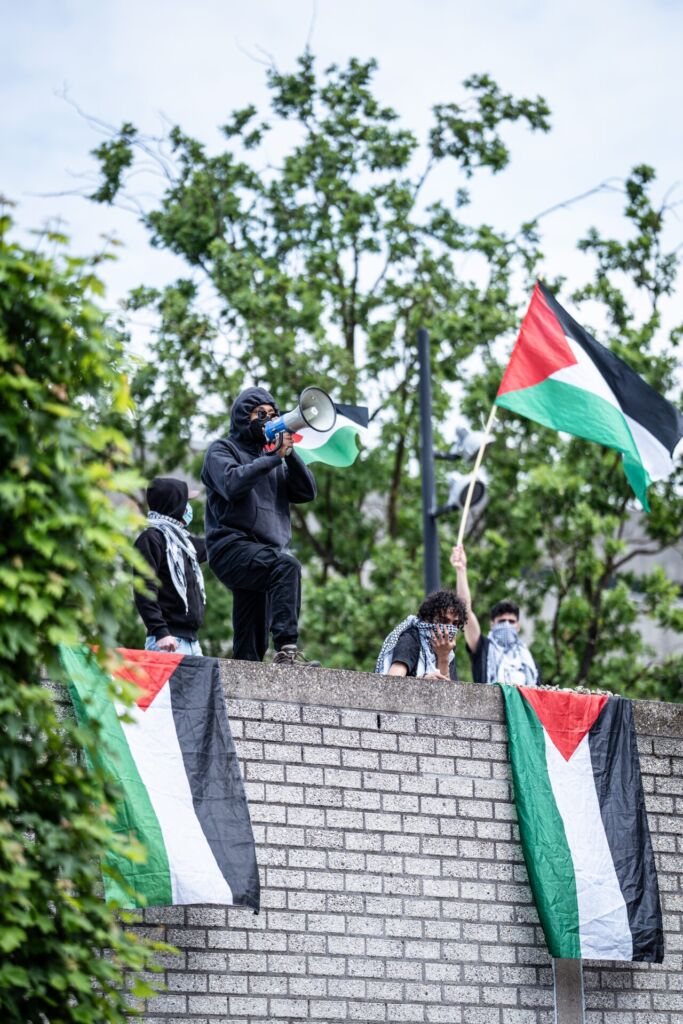
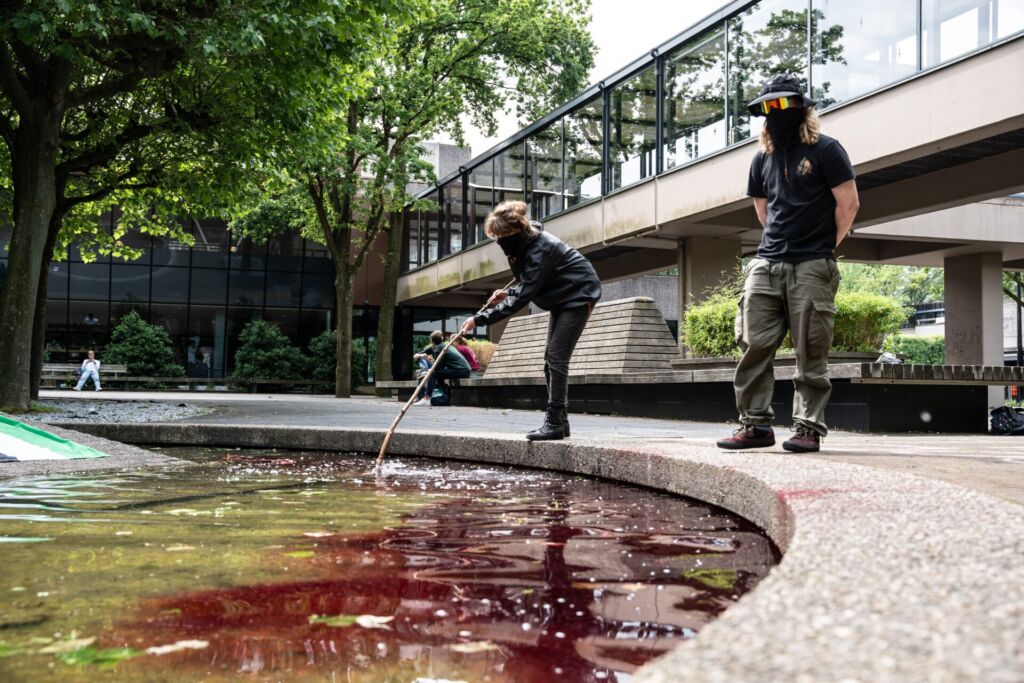
Friday, 12:30. Hundreds of protesters march across campus.
Approximately two hundred people gathered after 12:00 next to the Maria Montessori building to start a large protest march across campus. Around 12:30, the procession moves past the central library and towards the Heyendaalseweg. In the meantime, the by-now well-known slogans, including “From the river to the sea, Palestine will be free” and “Radboud, Radboud you can’t hide, you’re supporting genocide”, are chanted.
At the roundabout of the Erasmuslaan and Heyendaalseweg, the procession enters the street. After that, they are moving alongside traffic towards the Huygens building. Dozens of cars have to drive walking pace behind the crowd.
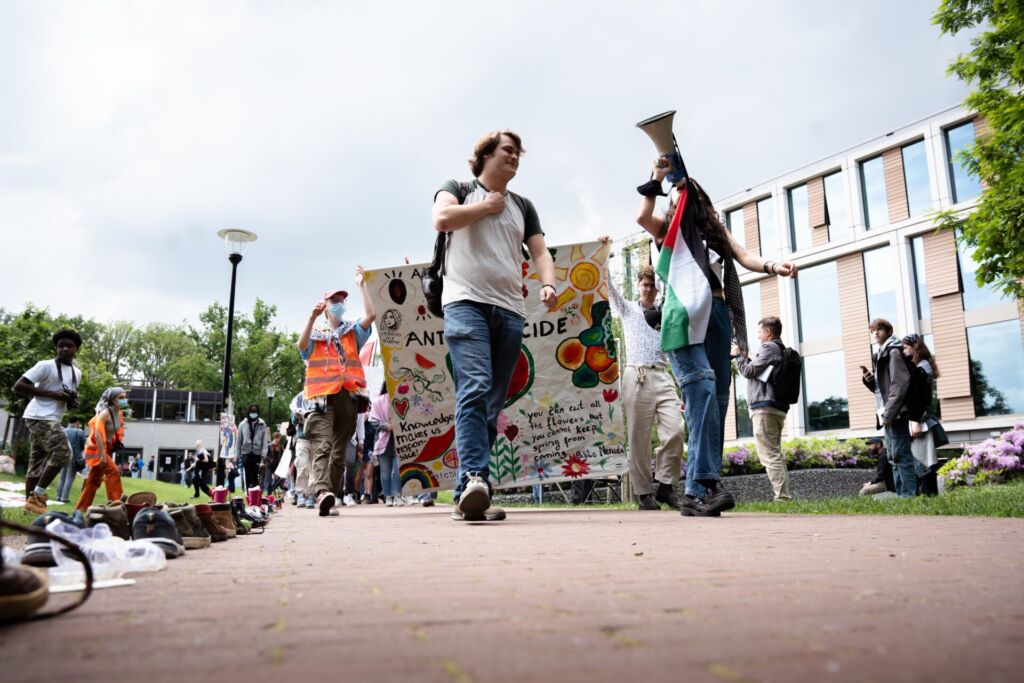
Friday, 11:00. Major protest march incoming.
The activists are getting ready for the fifth day of the occupation. Protesters are having breakfast at various picnic and camping tables. At 12:00 today, the group will take a long walk across the campus, says spokesperson Ties. That includes the Huygens building.
The camp has again grown overnight. Another central location has been erected under a large party tent on the field between the Maria Montessori and the lecture hall complex (CC). The shoe line is now taking shape: since yesterday, it has doubled in size and is now approximately 25 metres long.
Occupation of the lecture hall building does not seem likely today: the doors of the halls are locked and the entrance door close by the protesters has been partly blocked with chairs from the inside.
Yesterday, the Executive Board still spoke of a ‘new step in the protest.’ ‘We have communicated to a spokesperson of the protesters that our regular education and research activity, towards which we feel responsible, is disrupted by something like this,’ said chairman Daniël Wigboldus. He later nuanced his words by adding: ‘When something like this happens, you have to take a breath and see what happens. That is what we are doing right now.’
Thursday, 18:30. Lecture hall complex is closed.
The activists have left the lecture hall complex (CC). How late they have left is unclear at the time of writing. Around 18:30, the doors of the building, which usually closes at 17:30, were shut. With that, activists have stuck to an earlier promise that the occupation would be temporary. After the occupation, which took place earlier in the day, the protesters had organised multiple lectures and discussions about the situation in Palestine in the building.
In the meantime, students have returned to the camp. The latter continues to grow in size: additional overnight accommodations have been set up on the second lawn on Thursday afternoon.
Thursday, 17:15. Line of children’s shoes up until he Berchmanianum.
From the corner of the field in front of the Maria Montessori building up to the administrative offices: that’s where the activists want to place a line of children’s shoes. ‘Every single pair stands for a child whose life has been taken by the war,’ explains one activist.
The activists have asked employees and students to donate children’s shoes until the line reaches the Berchmanianum. ‘How many more children have to die before the Executive Board takes action?’ She asks loudly.
Thursday, 14:10. Activists hinder media from reporting.
Multiple journalists have been hindered and intimidated during the occupation at the lecture hall complex of Radboud University. Two photographers who were on site for Vox were hindered in their work by activists holding up umbrellas and scarves in front of their lenses. Gelderlander journalist Mitchell Suijkerbuijk also stated that he had been hindered. ‘I’m not one to complain, but that was very uncomfortable,’ he says.
In the meantime, songs against the media are being sung, including “Every time the media lies, another child in Gaza dies.” After several members of the press have left the room, a spokesperson of the activists says that the media are still welcome but that activists should refer them to a spokesperson.
Thursday, 13:35. Occupiers have climbed on the roof, waving flags.
Palestinian flags are now also flying from the roof of the Cultuurcafé. Multiple activists with face-covering clothing have climbed on the roof of the building and are waving flags.
Thursday, 13:30. Activists enter lecture hall for ‘temporary occupation.’
Following the current affairs lecture on the protests against violence in Gaza, dozens of activists from the camp entered the lecture hall complex (CC). A spokesperson of the activists took the stage right after the lecture from Radboud Reflects to announce a temporary occupation of the lecture hall. ‘40.000 people have been murdered, children have been torn apart by Israeli bombs. We know that Radboud is complicit. We will not rest until Radboud has cut ties with Israel, just as it has with Russia and South Africa.’
The activists say that they want to remain peaceful and intend on leaving the University building at the end of the day again. The idea is to use the hall for lectures by supporters today.
Thursday, 12:30. Institutions in Rotterdam close buildings for fear of vandalism.
The police put an end to the occupation of a university building in Utrecht on Wednesday evening. There are also protests elsewhere. Both Erasmus University and Rotterdam University of Applied Sciences have closed their buildings for today.
The fear of destruction after the riots in Amsterdam is palpable. After students in Rotterdam announced demonstrations on the Woudestein campus today, the mayor ‘strongly’ advised institutions to close their campus buildings for today.
Erasmus University has consequentially closed entirely today. Also the Rotterdam University of Applied Sciences is closing its buildings on the Woudestein campus. At other Rotterdam University of Applied Sciences locations, security guards are checking the identity of visitors. Education will partly continue online, but tests, promotions, and other meetings will be rescheduled. (HOP)
Thursday, 11:00. University will map all ties.
Radboud University wants to map out all its institutional associations and collaborations transparently. That states a press release (Dutch only) by the University. The University also intends to set up a committee that will evaluate collaborations based on the University’s mission. Open science will thereby remain the norm. When the overview of all its ‘worldwide collaborations’ will be finished is still unclear: according to the University, this will take some time.
Today, an additional Joined Assembly of the University (UGV) has been scheduled, during which the Executive Board will, amongst other things, discuss this issue with the University Student Council (USC) and the Works Council (OR). The USC announced yesterday via social media that the majority of its members support the demands of the activists.
Thursday, 8:20. Number of tents is increasing.
Some additional tents were added to the camp, which is gradually expanding towards the west side of the Maria Montessori building. The camp currently consists of 60 tents in total, even though it is not clear whether all of them are in use. It is, in any case, relatively quiet at the camp; most protesters appear to still be sleeping.
Wednesday, 16:30. Elinor Ostrom building only accessible through main entrance after 10 p.m.
After 10 p.m., the Elinor Ostrom building will only be accessible via its main entrance. That states a flyer at the entrance of the building’s bike parking lot. The reasons named are “safety considerations regarding demonstrations.”
Wednesday, 16:15. Radboud Reflects is organising a current affairs lecture about the student protests tomorrow.
Tomorrow afternoon, Radboud Reflects is going to organise a current affairs lecture about the student protests against the war in Gaza. What is the significance of these protests, and how do student protests differ from other protests? Why exactly are the protests directed at university administrations and not at politicians in The Hague? Political philosopher Mathijs van de Sande, political scientist Andrej Zaslove, and sociologist Katerina Manevska will discuss those questions during the lecture. The current affairs lecture will take place between 12:30 and 13:15 at the lecture hall complex (CC).
Wednesday, 15:45. University spokesperson: ‘No permission for projection on Erasmus building’
Yesterday evening, the demonstrators used large lamps to project in alternation the Palestinian flag and the words “Radboud University is complicit in genocide” on the Erasmus tower (see update Tuesday, 23:15).
Had this been permitted? ‘The Erasmus building is part of the University,’ a University spokesperson responded when asked. ‘The University does not grant permission for the projection and would like to distance itself from it. We’re looking into what we can do about it.’
Wednesday, 15:00. Dancing in the rain.
For the first time since the occupation, raindrops are falling on the camp. When the rain gets worse, most protesters are retreating to their tents.
Until one of the protesters puts ‘It’s raining men’ on the speakers, and a part of the group starts to dance.
Wednesday, 14:30. Support for activists as long as it doesn’t turn into an ‘Amsterdam situation’
There is solidarity for the goals of the activists on the Nijmegen campus, shows an inquiry by Vox, as long as it doesn’t turn into an ‘Amsterdam situation.’ Nevertheless, there are some doubts on whether camping alone will have the desired effects: ‘The university’s opinion on the matter probably won’t change, so they’ll have to sit there for a while.’
Wednesday, 13:00. ‘We will show up here every day until our demands have been met’
The protest march is turning around: the activists are moving back towards the camp in front of the Montessori building. The negotiators have come back outside, and the activists announce that they will return every day at 12:15 until the University has severed ties with Israeli institutions and meets their other demands, including the cancellation of its contract with HP Computers because they are delivering hardware to Israel.
Wednesday, 12:45. A few activists are entering the Berchmanianum.
About ten activists have been admitted to the Berchmanianum to talk to the Executive Board. Everyone else – including the press – has to wait outside. ‘Our negotiators are now inside,’ calls one protester via a megaphone. ‘Thank you for being here and standing on the right side of history.’
Wednesday, 12:30. Protest march on its way to the Berchmanianum.
A long line of people has just walked from the camp in front of the Montessori building, via the Erasmus square, towards the Berchmanianum. Hundreds of people are singing slogans, including Free, free Palestine and There is only one solution, student Intifada! Many activists have coloured the palms of their hands red.
Wednesday, 10:30. Two-part podcast series on Palestine. Part one: Noura on settler colonialism.
Assistant professor for Human Geography and member of Situating Palestine Noura was a guest on the Vox podcast In a Nutshell. In the podcast, Noura answers questions about what settler colonialism is, how it works, and how it affects Palestinians today.
The podcast episode is the first of a two-part series on Palestine, where Vox offers a microphone to researchers to tell us about their perspectives and knowledge on the topic in its broadest sense.
The episode is available on the Vox website, Spotify, Amazon Music, PocketCasts, and AntennaPod (App).
Wednesday, 8:30. ‘Let’s keep the protests peaceful’
The Gaza protest in Nijmegen is still an example of critical citizenship, observes Willem Halffman in his new column (in Dutch). ‘Let’s keep it that way.’
Wednesday, 8:30. More tents than yesterday.
Approximately 45 tents are now on the lawn, fifteen more than yesterday. It is still mostly quiet at the camp; the first protesters are slowly getting out of their tents.
Tuesday, 23:15. Large projections on the Erasmus building.
In the evening, large lamps alternately projected the Palestinian flag and the text ‘Radboud University is complicit in genocide’ onto the Erasmus Building. The exact time when the projections first appeared is unknown. Around 23:40, they were still visible.
Earlier in the evening, a live band also performed at the campsite. Several activists were dancing and waving Palestinian flags.
Tuesday, 21:30. Activists announce protest march to Berchmanianum
This Wednesday at 12:15, activists will start a protest march towards the Berchmanianum, where the Executive Board has its offices. They announced the march via social media. “They didn’t come to publicly address our demands, so we will go to them,” reads a statement on the Nijmegen protest camp’s Instagram account. Earlier this evening, the president of the Executive Board, Daniël Wingboldus, came to the camp to assess the situation and talked to the activists.
Tuesday, 17:30. Demonstration starts.
The solidarity demo in support of the protesters at the camp has started. Again, approximately one hundred students and employees are gathering along the lawn. Some speeches are delivered. One of the speakers thanked the demonstrators for their support. This is followed by the familiar slogans.
Tuesday, 14:00. Solidarity demo.
On X, formally known as Twitter, social geography assistant professor Harry Pettit has called for a solidarity demo in support of the protester’s demands. ‘The CvB continue to ignore their demands,’ according to Pettit.
Yesterday, demonstrators told Vox that they would break up their camp only if three demands would be met: cut all ties with Israel, condemn the genocide in Gaza, and support Palestinian students and universities.
Tuesday, 12:30. Lecture on decolonisation.
In the camp, a spokesperson is announcing the programme for this afternoon. At this moment, a lecture by PhD candidate Alison Fischer from Leiden about decolonisation of the curriculum starts. Then the activists chant slogans again: ‘Free free Palestine / Boycott, boycott Israel’ and ‘Radboud, Radboud, you can’t hide / We charge you with genocide.’
Tuesday, 12:25. Spending the night on campus is not allowed, but the university has not filed a report.
It appears as if Radboud University will continue to tolerate the camp on its campus for now. That can be concluded from answers to Vox questions by a spokesperson earlier today. The Executive Board had advised three students and two lecturers yesterday not to spend the night, he says. That is, in principle, not allowed. ‘Protesting on campus is, of course, allowed, there is room for that. But not for overnight stays. The campus is not a recreation ground. The campus is not set up for that. That is why we advised against staying the night.’
But as long as the situation remains peaceful and demonstrators adhere to general standards of decency, the University does not appear to take action. A police report was not filed. The spokesperson did not comment on whether security measures will be increased at night or whether additional security measures have been taken. The University has, however, had contact with other universities on how to handle this situation (see update from 11:30 in this liveblog).
Tuesday, 11:30. ‘Occupying buildings is not allowed.’
Dutch universities and colleges have collectively drawn up guidelines on how to deal with protests on campus. The guidelines can be accessed on the website of the Universiteiten van Nederland. The two-page document states that educational institutions aim to ensure a peaceful protest, that protests need to be reported by a student or employee to the institution in advance, and that neither an occupation of buildings nor criminal offences are permitted. It is also prohibited to wear face-covering clothing and demonstrators must be able to identify themselves at all times when asked to do so by security.
If protests do not abide by these guidelines, universities and colleges will focus on de-escalation. In the case of disorder, representatives must first ask protesters to leave the site before a trespassing report can be filed. Then, the police can take action. Following a report by the university, the mobile police unit may decide to prosecute protesters for destruction or violence. Universities will always report criminal offences, including threats, violence, vandalism, or public violence.
Tuesday, 8:00. Most protesters are still sleeping
31 tents are up, and most protesters are still sleeping. The police didn’t intervene last night, tells first-year student Radjen, who has volunteered for a shift with the first aid team. Most protesters went to bed around midnight. ‘Most students and employees stayed, some who couldn’t sleep went back home.’
A first aid and a safety team were alert the entire night. Radjen hasn’t slept yet. ‘That takes a toll. But thank god there’s coffee, and it’s a pleasant atmosphere.’
Close by the campsite, an employee of the maintenance department is cutting some bushes, causing some movement in the tents.
21:45. Mayor Hubert Bruls sees no reason to intervene on campus
Nijmegen’s mayor Hubert Bruls sees no reason for an intervention on campus. That confirmed a spokesperson in De Gelderlander. Earlier today, the Executive Board had asked demonstrators to leave the campus by 18:00. The protesters had not abided by the request. What this means for further developments during the night is not clear.
21:10. ‘Who wants to leave the university campus? Nobody?’
Nijmegen for Palestine spokesperson Ties takes the stage. He informs the protesters that the university has asked them to leave the university campus. He asks who plans on doing that. Not a single hand is being raised.
20:58. Talks between the Executive Board and demonstrating students
A University spokesperson has confirmed that they were in conversation with a representative of the demonstrating students. ‘So far, the demonstration has remained peaceful and there is a good atmosphere,’ so the spokesperson.
According to the protesters, the Executive Board had asked them earlier today to vacate the campus before 18:00. The consequences of a refusal to abide by the university’s demands are unclear.
One of the protesters calls out that demonstrators can follow legal training – so they know their rights and obligations. It is slowly starting to get dark on the campus. Palestinian rap music plays through the speakers.
20:25. In Groningen, demonstrators allowed to stay ‘if protest remains peaceful’
Protesters at the Harmonie building at the University of Groningen are allowed to spend the night – under the condition that the protest remains peaceful and does not disrupt traffic. That confirmed a spokesperson of the mayor in Groningen’s university magazine UKrant. As a precaution, the university has closed its buildings in the city centre.
After some calm hours, the Nijmegen protesters are chanting again ‘Free, free Palestine.’
19:00. Demonstration not over yet
While the sun is setting, there are no signs that the demonstration is going to be over any time soon. The protestors are busy at the food stand, where a rice dish is in high demand. The University is meanwhile unavailable to answer questions regarding their further plans. It is presently unclear whether and when the camp will be cleared.
17:20. Protestors told to leave in half an hour
The University wants the protestors to leave the campus until 18:00. That is the result of talks between the Executive Board and spokespeople of the protest group, according to one protestor who took to a megaphone. The activist stated that they do not plan on leaving. ‘We are demonstrating peacefully here,’ he shouts. ‘We won’t leave until we’re sent away. We will stay until they call the police on us. We are staying to fight for Palestine.’
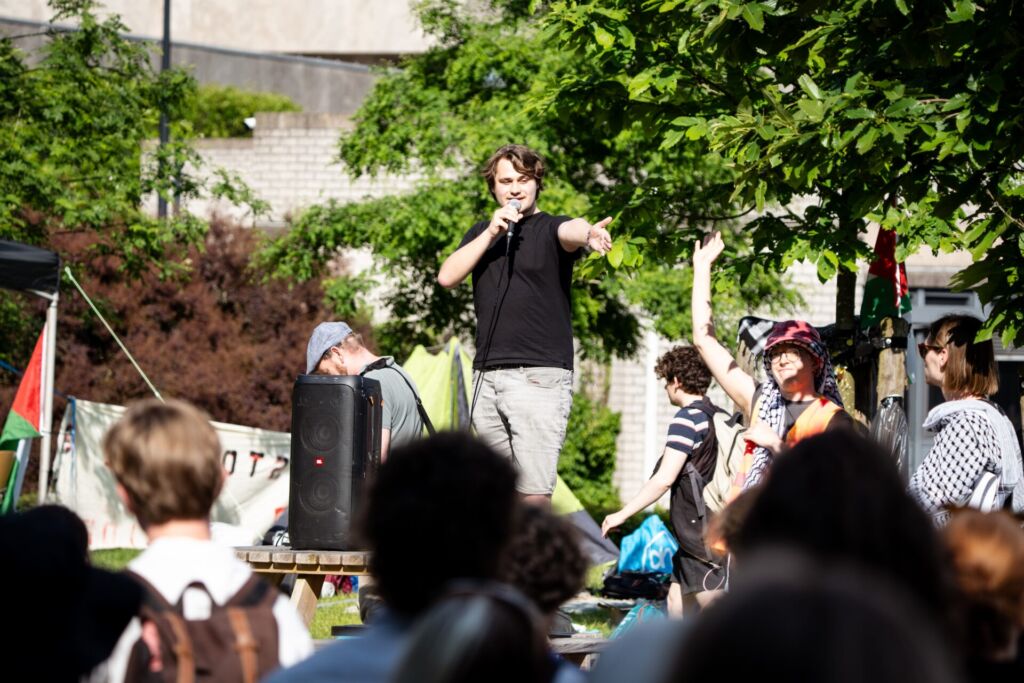
16:25. Protestors from outside the university
The Pro-Palestine protest is also attended by Nijmegenaars without links to Radboud University. One of them is Bo Smits. ‘I think it’s brave of the students to stand up for this cause,’ she says. ‘If the protest continues, I will definitely come back to support them.’ She’s wearing a keffiyeh, just like Noud van Klinken. The latter works for a start-up on campus and is holding up a sign made by the Nijmegen artist Jac. Splinter. Smits and Van Klinken have also attended earlier protests to declare solidarity with Palestine. ‘We’re going to as many as we can.’ They hope that the atmosphere on the Nijmegen campus will remain as good as it is right now. ‘That’s heartwarming.’
Earlier today, this update was accompanied by a photo of a protester. The picture gave the impression that the protester was not a student at Radboud University. This turned out not to be the case and the photo was consequentially removed.
16:05. Determined to stay
The protestors are set on remaining at the camp on campus until the Executive Board meets their demands. The most important one: cut all ties with Israeli universities and companies. ‘Even though the universities don’t throw the bombs themselves in Gaza, they contribute to a state that does,’ says Ties, spokesperson for Nijmegen for Palestine. ‘We’re not leaving until Radboud University cuts all ties with Israel.’
15:45. Mobile police unit in Amsterdam
In Amsterdam, on the UvA’s Roeterseilandcampus, the mobile police unit has again intervened, according to NOS. Protestors had been asked shortly before to leave the university’s campus.
15:15. Management faculty gives room to protest
The Management Faculty announced in an email today that students and employees are free to participate in the ‘national walkout.’ If a teacher cancels lessons for this reason, students will be informed at a later point whether and to what extent the teaching will be made up for. Students who participate in the pro-Palestine demonstration today and miss lectures or work groups because of that will receive information on how they can potentially compensate for absences.
14:20. ‘The right to protest is an important commodity’
Also chairman of the Works Council, Amarins Thiecke, has temporarily traded the Joint Assembly for the lawn in front of the Maria Montessori. ‘We think it’s important to show up here, especially considering how other universities have dealt with the protests,’ she says. ‘The right to protest is an important commodity, especially at universities. We hope that students and employees can also have their voices heard and we’re happy to contribute to that.’
14:15. Military doctrines
One of the protestors is Tom Steenblok of the Knokpartij. ‘It makes no sense that Radboud University has not yet severed ties with two of the Israeli universities,’ he says. ‘Tel Aviv University has developed military doctrines for the Israeli army and contributes to the development of weaponry. The Hebrew University of Jerusalem houses military programmes on its campus. We have already questioned the Executive Board multiple times about this at the Joint Assembly, but the Board has taken no action. That is why several members of the University Student Council have left this afternoon’s meeting.’
13:55. ‘Israel’s reaction is entirely disproportional’
Second-year history student Joris (last name known to the editorial office) is one of the protestors: ‘I’m here to show that what’s happening in Gaza right now is not okay,’ he says. ‘Of course, the attacks on the 7th of October were terrible, but Israel’s reaction is entirely disproportional. In the past, wars in Iraq and Afghanistan have resulted in nothing.’
13:50. First tents set up
After approximately twenty minutes, the protestors walk towards the Maria Montessori building. Demonstrators have set up several tents next to the lawn of the building of the Social Science faculty. Several speeches are held by the tents.
13:30. Statement from the councils
At the beginning of the Joint Assembly in the Aula, also at 13.30, Tom Steenblok of the Knokpartij takes the stage. In the name of the protestors, he hands a letter to the Executive Board. ‘There will be a camp set up on campus and the protestors are not planning on leaving before the demands have been met,’ he says, after which part of the university’s student council gets up and leaves the assembly. A few minutes later, also Daniël Wingboldus (chairman of the Executive Board) and Gerben Smit (head of Radboud Services) are leaving the assembly.
13:30. Walkout begins
Following the book presentation of Maya Wind, approximately one hundred students and employees walk towards the Erasmus square, where they are greeted by just as many students and employees. Soon, they are chanting ‘Free, free Palestine’, ‘From the river to the sea’, and ‘No justice, no peace.’
12:15. Reading Maya Wind
Israeli universities are closely intertwined with the Israeli state and army and therefore play a major role in the oppression of Palestinians and the war in Gaza, according to scientist and activist Maya Wind. The Jewish-Israeli anthropologist, associated with the Canadian University of British Columbia, has recently released the book Towers of Ivory and Steel: How Israeli Universities Deny Palestinian Freedom. Her lecture at Radboud University was the first of a tour across five Dutch universities this week. Later today, Wind is scheduled to speak at a manifestation in front of the Maria Montessori building.
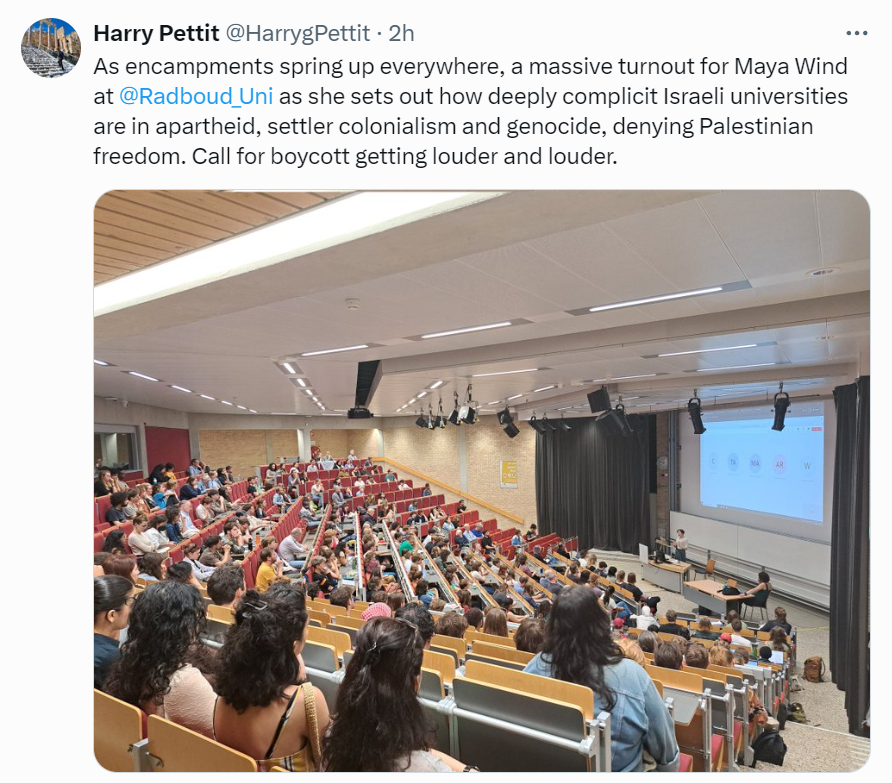
Background to the student protests on Monday
Hundreds of people have gathered at Radboud University for a Pro-Palestine protest on Monday afternoon. This follows a statement by the Nijmegen for Palestine collective published on the organisation’s Instagram page last Friday. The group had called for a walkout following the student protests in Amsterdam and Utrecht last week, which had involved police violence against protestors. In their statement, Nijmegen4Palestine had expressed that they were “horrified by the actions of the Executive Boards of the University of Amsterdam and Utrecht University” and formulated demands directed at Radboud University, including more transparency of Radboud University’s ties with Israeli institutions.
The University had reacted to the call for a walkout in a statement on Sunday. In the statement, the University emphasised that students and employees were “free to express their opinions as long as this goes without racism, sexism, discrimination, violation, (physical) threats, or the use of slogans that call for violence and/or exclusion.”
